To read more about lifestyle in Croatia, follow TCN's dedicated page.
Remembering Oliver Dragojević: Croatia Honors Iconic Singer on 4th Death Anniversary
July 29, 2022 - Oliver Dragojević lost his battle with cancer on July 29, 2018, at the age of 70. Four years later, we remember the region's most beloved singer.
The famed and favorite Croatian singer forever closed his eyes in the early morning hours of July 29, 2018, following a tough battle with lung cancer discovered in August 2017.
Oliver Dragojević left behind his wife Vesna, sons Dino, Davor, and Damir, five grandchildren, and numerous bereaved colleagues and fans. The day of his death was proclaimed a national day of mourning, and for his final farewell in Split on July 31, 2018, tens of thousands of people paid their respects in a spectacle that will be remembered and recounted for many years to come.
Hajduk Split fan group Torcida said goodbye to the musician by lighting a flare with Oliver's image from the bell tower of Sv. Duje, and for the last time, Oliver embarked on his final journey to his hometown Vela Luka with hundreds of boats decorating the sea. Oliver was buried in Vela Luka on August 2, per his wishes, and locals paid their respects for days, leaving flowers in front of the home where he was born.
Oliver's wife Vesna penned an emotional letter to the singer on the 4th anniversary of his passing:
"Our dear dida. We are all here. 14 of us. Your friends are also here today. Lots of them. Today is a day for songs, not for crying," she began.
"Everyone is contacting us, and your fans are coming. They are talking in all languages, and I nod my head; I assume they are praising you. You left us a big burden. Now they have shifted to me. You know I have been skillfully avoiding it.
I've painted more pictures of myself in one year than in my whole life. Today is a big concert. I know you'd enjoy playing and drinking, but they're doing it for you this time. Lots of young people and your old friends.
I know you don't like all this pomp about you. We're just observers, and we're not part of the organization. I know what you'd say, but I won't say anything. There's nothing new with us. We continued as we lived with you. If we ever meet, you'll pay us for this. We love you until the end of our lives," Vesna concluded.
Vesna and Oliver met in the summer of 1973 and married just ten months later, in March 1974. She stayed with him until his death. Oliver once even admitted that he would not have married Vesna if they had met after he became famous as he would have thought she was with him for money.
On July 29, the now traditional "Trag u beskraju" concert will be held on the Vela Luka waterfront to honor the Croatian singer. Many Croatian musicians will perform his most popular songs.
Schedule of events for July 29
09:00 Wreath-laying at the local Sv. Rok Cemetary
10:00 Recital at Sv. Josip Church
Performers: Matija Cvek & Ante Gelo & Sequentia Quartet
21:00 Concert "Trag u beskraju" on the waterfront in Vela Luka with a live broadcast on HRT1
Performers: Zorica Kondža, Doris Dragović, Tedi Spalato, Petar Grašo, Petar Dragojević, Eli Žuvela, Iva Ajduković, Jure Brkljača, Matija Cvek, Igor Drvenkar, Alen Đuras, Sabrina Hebiri, Dino Jelusić, Marko Kutlić, Stjepan Lach, Lorena Bućan, Josip Palameta, Dino Petrić, Bruna Oberan, Sequentia Quartet
To follow the latest sports news in Croatia, follow TCN's dedicated page.
Remembering Oliver Dragojević on His 74th Birthday
December 7, 2021 - Remembering Oliver Dragojević on December 7, what would have been his 74th birthday.
It has been three and a half years since Oliver Dragojević has been gone. For his birthday on December 7, we remember the music legend who touched the region with his timeless songs, charm, and simplicity, writes Gloria.
Since he lost the battle with cancer in July 2018, he has remained immortal to the people of Split. Oliver could never imagine leaving his beloved Split, although he was offered countless times to move to Zagreb and even some larger European capitals.
Oliver loved Split and especially appreciated that the life of an "ordinary" man could live there. He went out for coffee with his family every day, visited the fish market, and often sat on a bench on the Riva, enjoying the sea view and boats.
Neighbors on the street, where he had lived for the past twenty-something years, said he would greet any passerby, whether he knew him or was in a hurry. "I would never move out of Split because I enjoy it. As soon as you live in Split, and if you live, you can't be an uncommunicative or conceited star," Oliver said.
We cannot forget how much he loved Vela Luka on Korčula, which was his permanent home until he was two years old, and where his mother Kata, a cleaner, and father Marko, a worker in the Port Authority, were from. Oliver was their fifth and youngest child.
His three sisters died before he was born, and his brother Aljoša, who also died from cancer in 2011, was three years older than him.
Vela Luka was his oasis of peace in which, as an adult, Oliver spent every summer with his family. At his request, he was buried in the local cemetery of Sv. Roka. His grave is regularly visited by his fans from all over Croatia and beyond.
Talking about their plans for old age, Vesna Dragojević admitted that the two of them intended to spend the rest of their lives in Vela Luka, which is why they bought another house there more than ten years ago. Since his death, her sons, daughters-in-law, and grandchildren have kept her company.
"With me are sons Dino and Damir, their wives Nevena and Vanda, Dino's children Duje, twins Lucija and Toni and Damir's little ones Vinko and Margita. And Davor, his wife Karmen, and their sons Marko and Luka who are staying with Karmen's parents visit every day," Vesna revealed to Gloria this summer, on the third anniversary of Oliver's death, when many musicians perform in Vela Luka to honor the music legend.
Oliver was a passionate lover of the sea and always pointed out that he needed no luxury but a boat and fishing rods to catch big fish. While his former boat was moored in the ACI marina in Split, he often spent part of the day in the cabin watching his favorite TV series "Malo Misto." His singing partner and great friend Zlatan Stipišić Gibonni called him 'captain' in his farewell speech.
"I would like to tell my Captain that everything is as it should be. And that all this sea is just for him," Gibonni said sadly at the commemoration for Oliver at HNK Split in August 2018.
People close to Oliver will always say first that he was a family man above all else. He spent a full 44 years married to Vesna, and in 2009 they secretly renewed their marriage vows in the church in Vela Luka.
When they fell in love in her hometown of Dubrovnik, Oliver performed with the band Batali and was unknown to the general public. He was 25 at the time, and Vesna was six years younger. They had a modest wedding in Oliver's parent's apartment in Gripe and shared the first years of their marriage with his brother Aljoša and his family.
In an interview with Gloria after Oliver's death, Vesna said that the secret of their marriage was that they had the same views. They did not drive expensive cars and clothes but secured a future for their sons Dino and twins Davor and Damir. Oliver also helped Vesna get through the most challenging periods - a stillbirth in the first year of marriage.
"I remember best our last sixteen years when he decided to pull the brakes and perform less and be with us more. I was always happy and fulfilled with Oliver. I don't know any man who was so easy to love. He didn't have to do anything special to feel comfortable next to him," Vesna said in 2019 when she emphasized that Oliver was the most tender father in the world. He never raised his voice or said a harsh word.
Everyone knew about Oliver's devotion to his family in Split because he always walked around the city in the company of his son or Vesna.
"My sons have always come first, and the best thing I could do for them is to let them choose their path. I don't mind that they chose tourism instead of music. But that's why I gave them the sea and fishing," joked Oliver, who enjoyed his role as a grandfather in his later years.
His oldest grandson Duje was born in 2007 and is now in the eighth grade, and the youngest Luka is a year and a half old. Oliver did not welcome his birth, as well as three-year-old Marko, but there is no doubt that he would adore them, as well as his other five older grandchildren.
Since Oliver's departure, many of his colleagues have claimed there is no other musician like him - a legend during his lifetime. His career lasted for half a century; he won as many as 31 Porin and his favorite Split Festival many times. His incredible musical journey began in 1975 when he performed an anthological song by the late Zdenko Runjić, "Galeb i ja”.
Oliver graduated from music high school, played the harmonica, piano, guitar, and clarinet, and is our only singer who has performed in the world's most famous concert halls: New York's Carnegie Hall, London's Royal Albert Hall, Paris' Olympia, Vienna's Konzerthaus and opera in Sydney.
In addition, the audience and critics adored his vocals with which he painted all his songs: from the older "Magdalena", "Ključ života," and "Ostavljam te samu" to "Cesarica." However, this 1993 song, written for him by Gibonni, was a new turning point in his career - as younger generations began to listen to him.
"To last in music, you need to have a good song, believe in what you're doing, and be persistent as a horse. I didn't plan anything in my career. My vocal cords just spent a lot of singing, sleepless nights, and cigarettes," Oliver once said.
At the end of 2017, he was to hold two celebratory concerts at the Spaladium Arena to celebrate 50 years in music and his 70th birthday. The last time he appeared in front of the audience was at a show for the fight against cancer at the Croatian National Theater in Split in October 2017. Vesna saw symbolism in that because he held over 400 humanitarian concerts during his lifetime.
Oliver's 357 days battling lung cancer are still reluctantly remembered by his loved ones. The world collapsed for their family when they found out about Oliver's diagnosis in August 2017. There was no doubt that they faced a much more significant challenge than when Oliver suffered a mild stroke in 2003.
"I am a nurse by profession, and in ten years of work, I have seen many patients with this diagnosis who have not been cured. Oliver's disease was a shock to all of us because he was in great shape that summer. He always played futsal; he smoked less and got rid of alcohol long before that," Vesna admitted two and a half years ago. His desire to live, sing and honor the sea did not leave him even when in the summer of 2018 - after several hospitalizations and hard struggles - he ended up in the hospital for the last time, where he eventually died on July 29 at 4 am.
Oliver's farewell is remembered as unparalleled. Hundreds of thousands of people who gathered on the Riva said goodbye to the adored musician, and almost all of his colleagues were among them.
His coffin was transported to Vela Luka by a special catamaran, which was accompanied by sirens and bells from the St. Duje Cathedral and by small boats and ships of the Ministry of the Interior and the Croatian Navy. Torches colored the sky above Split, and Torcida organized the spectacle as Oliver was a passionate supporter of Hajduk.
Split will sing his songs in his honor, together with Oliver's nephew Petar Dragojević, at Zvončac tonight.
To read more about lifestyle in Croatia, follow TCN's dedicated page.
3 Years: Oliver Dragojević Anniversary to be Marked in Vela Luka
July 20, 2021 - The Oliver Dragojević anniversary will be marked in Vela Luka on Korčula, where concert evenings will be held to remember the Croatian singer 3 years after his death.
When he closed his eyes forever on July 29, 2018, everyone shed a tear for the singer whose songs have marked and will mark the generations to come. Oliver Dragojević gave the region unforgettable hits, many of which will be sung again this year to mark the third anniversary of his death, reports Slobodna Dalmacija.
Vela Luka, where Oliver spent the most beautiful days of his childhood and where he now rests, is preparing two musical evenings in honor of the Croatian musician.
HRT will broadcast live from Korčula next Thursday, July 29, starting at 10 pm, as a concert will be held on the Second Program. The host of the event is Duško Ćurlić. The audience in Vela Luka, as well as the spectators in front of their screens, will have the opportunity to hear Oliver's most beautiful songs such as the inevitable "Cesarica," "Galeb," "Traga u beskraju", "Kad mi dodeš ti", and many others.
The songs will be performed by Gibonni, Tedi Spalato, Antonio Serrano, Marko Tolja, klapa Ošjak, and Dupini. Ante Gelo will take care of the great musical accompaniment with an orchestra conducted by Alan Bjelinski.
The second evening is reserved for young stars from the Croatian stage that we've met in various HRT shows such as "A strane" and "The Voice." This year's Croatian representative at the Eurovision Song Contest, the young Albina Grčić from Split, will sing in Oliver's honor.
Two days before the first concert, the exhibition "Oliver through the lens of Livio Andrijić," the head of the photo agency Cropix, will be officially opened. It contains 35 photos of the singer and can already be seen at the Vela Luka Cultural Center.
"When you're friends with someone, you don't think you should take a picture with them. If you happen to remember that, then you think: There is time, we will meet and take photos. And then it turns out that there was not enough time, that many of your moments together were not recorded in photos, but that is why they live forever in their hearts," Livio Andrijić said recently for Jutarnji list.
For more, follow our dedicated lifestyle section.
Split's Most Famous Love Story: Roko and Cicibela
June 20, 2021 - Unlike the tales of Romeo and Juliet or Helen of Troy and Paris, the origins of Split's most famous love story are not shrouded in myth and legend. Instead of knights and nobles, they revolve around a real-life couple - a poor fisherman and his wife who made a home from an abandoned boat in Split's port. Meet Roko and Cicibela.
As any Split fan will tell you, it doesn't take much to be swept away by the city lying at the foot of Marjan Hill. And if you are of the romantic kind, there's nothing like walking hand in hand with your significant other amid the swinging palm trees on the Split promenade, or Riva, as it is known to locals.
I often hear tourists ask for recommendations of ''hidden'' gems and places known only to locals. The history of Roko Ljubica and Dujka Bašić is a perfect example of one such gem, although it has yet to be recognized as a tourist product. A shame, for they were living witnesses of the transformation of Split from a small port town into a modern city at the turn of the century.
What is more, their steps are easy to retrace. Although they left no physicial proof of their existence, the miniature marina where they spent most of their years together, the church where they got married, the streets they walked to buy tobacco and bread and sell fish that Roko would catch - still stand to this day.
Roko Ljubica married Dujka Bašić, a poor illiterate girl from Split's neighbourhood Veli Varoš on February 16th, 1906. The people of Veli Varoš nicknamed her Cicela or Cicibela, meaning a street cat, because much like a street cat, she had no one to depend on but herself.
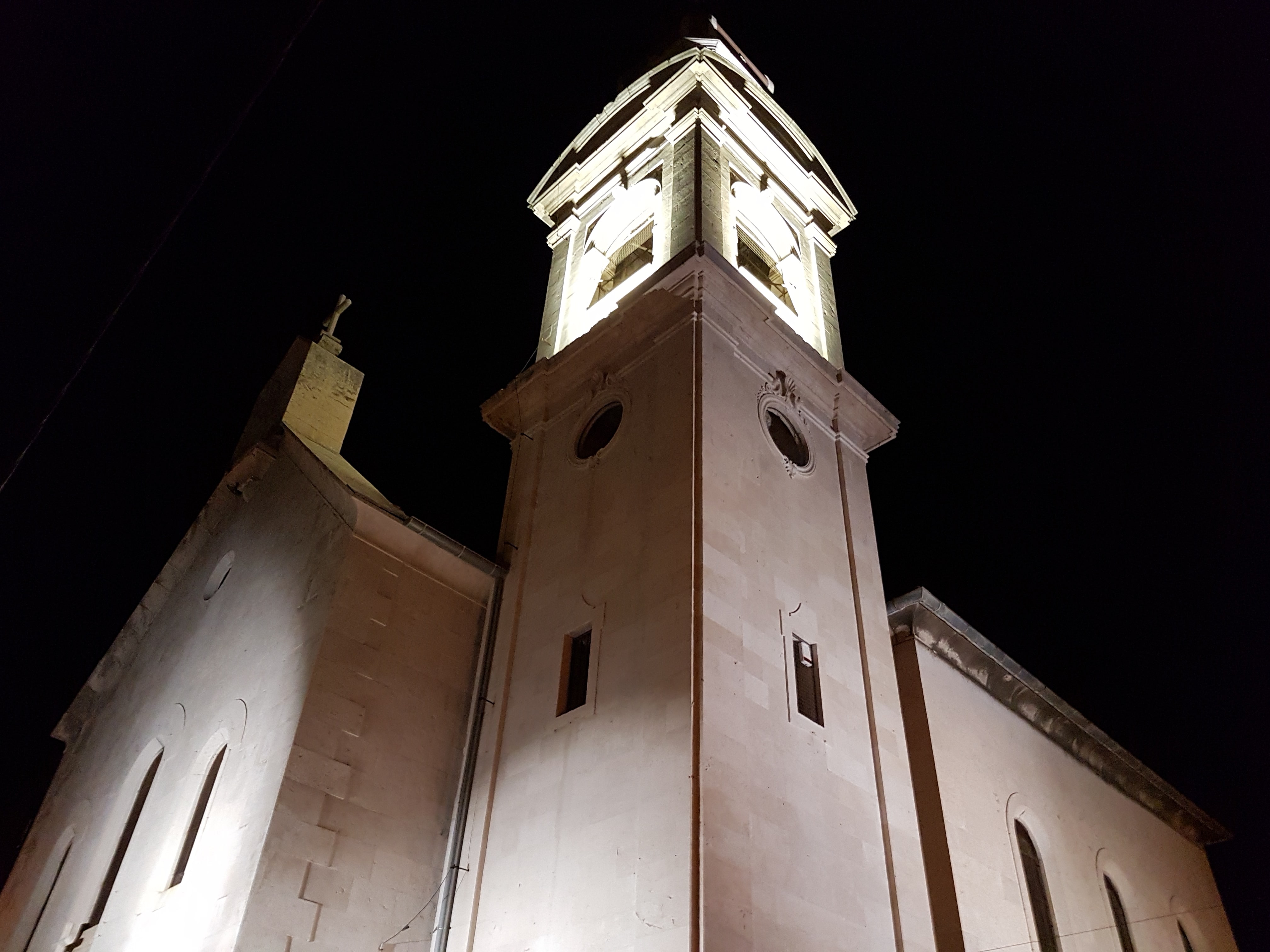
Saint Cross Church (Crkva svetog križa) where Roko and Dujka married in 1906.
As a fisherman, Roko was able to provide for the two of them, but his earnings didn't offer enough to buy them or build them a home. Instead, they lived out their life in a miniature marina of Matejuška, in the Split's port northwest corner, which for decades served as a shelter for fishermen's boats. One such boat served as their home. Abandoned and full of holes, which Roko closed with cement, it was no longer fit for going to sea.
In 1906, what Roko and Cicibela could see from their boat in Matejuška, had they looked toward the promenade in the evening, were not twinkling lights and palm trees. There was nothing but darkness, and on clear and starry nights, the shapes of mulberry trees, which used to grow there. The first palm tree, a plant this city is unimaginable without now, wasn't planted until 1921. Maybe it wouldn't have been at all, as mulberries with their long and firm leaves and branches provide genuine shade. However, in Split of that time, mulberry fruit falling from the trees got trampled over by livestock and carriages which were passing through the port's street every day from the direction of Veli Varoš and caused a foul smell in the summer heat.
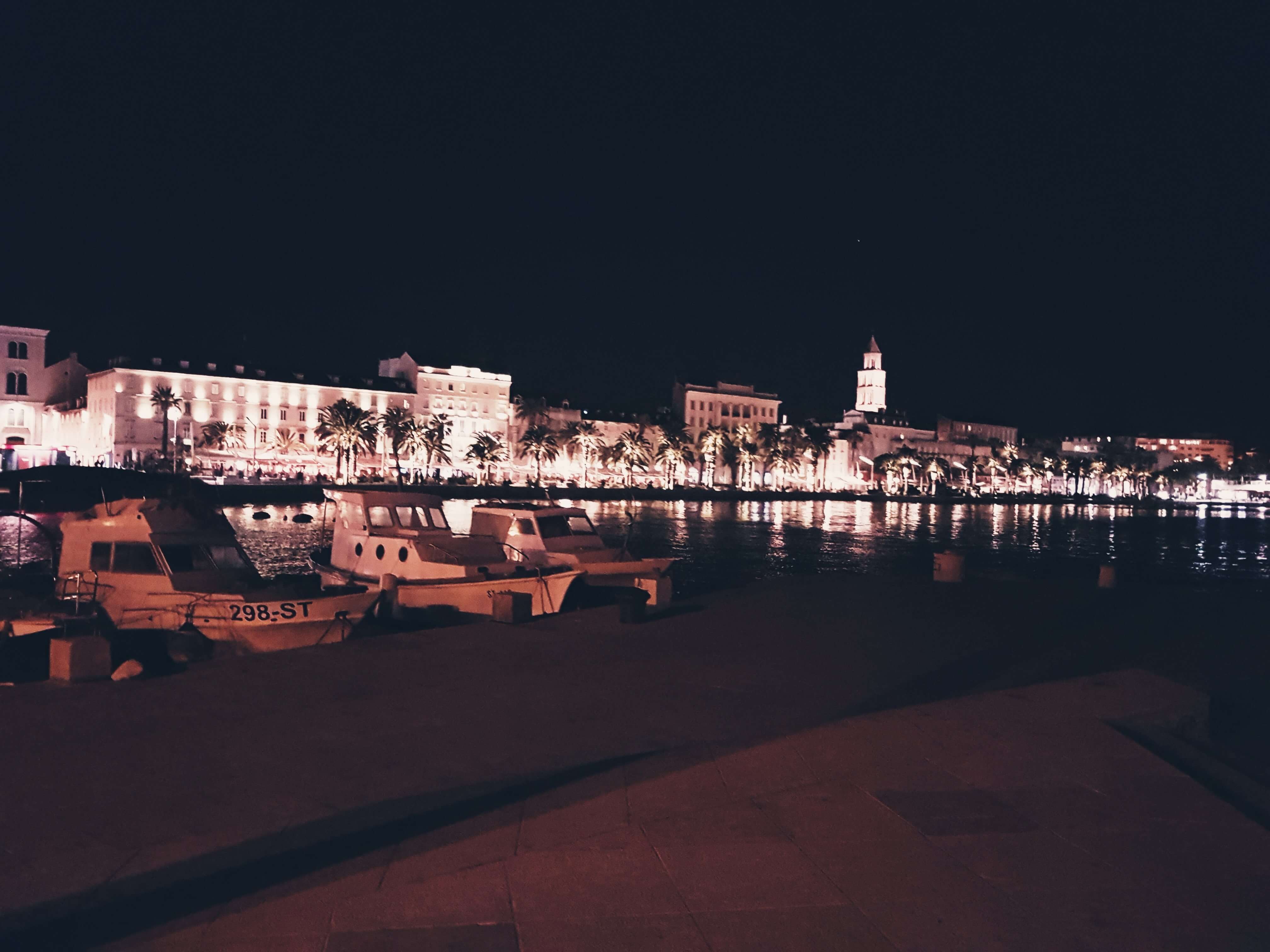
The view from Matejuška to Split's Riva and the eastern part of harbour. The plaque dedicated to Roko and Dujka (Cicibela) can just be seen on the right-hand side as a single dark rectangle amid lighter ones.
Although their boat provided little cover from the elements, especially in the winter, Roko and Dujka continued to live there until the late 1930s - they even adopted a dog named Belina - when the city provided them with a room in an almshouse behind the Vestibul of the Diocletian's Palace.
As posh as it sounds, living near the former imperial residence meant residing in a crowded, noisy, and dirty place, and Roko spoke about it with disdain at any given opportunity. It wasn't a good place for his beloved Cicibela. Split's annals mark that, in the end, the municipality gave in and gave them a small house in Antonova Street, near their former home of Matejuška. It was there that they lived out their last days in the winter of 1936. The exact location of their final resting place remains unknown.
At a first sight, the story of Roko Ljubica and Dujka Bašić is nothing special. In comparison to many other historical figures who walked the streets of Split – from the Roman emperor Diocletian onward, their lives are only a thread in the rich tapestry of Croatia's most famous port city.
And yet, this story of ordinary people who owned little aside from the clothes on their back - continues to awake interest. Their life was also immortalized in several screens and stage pieces thanks to the legendary Split writer and journalist Miljenko Smoje and the song by Oliver Dragojevič Ča je život vengo fantažija (Life's Nothing Other Than a Fantasy).
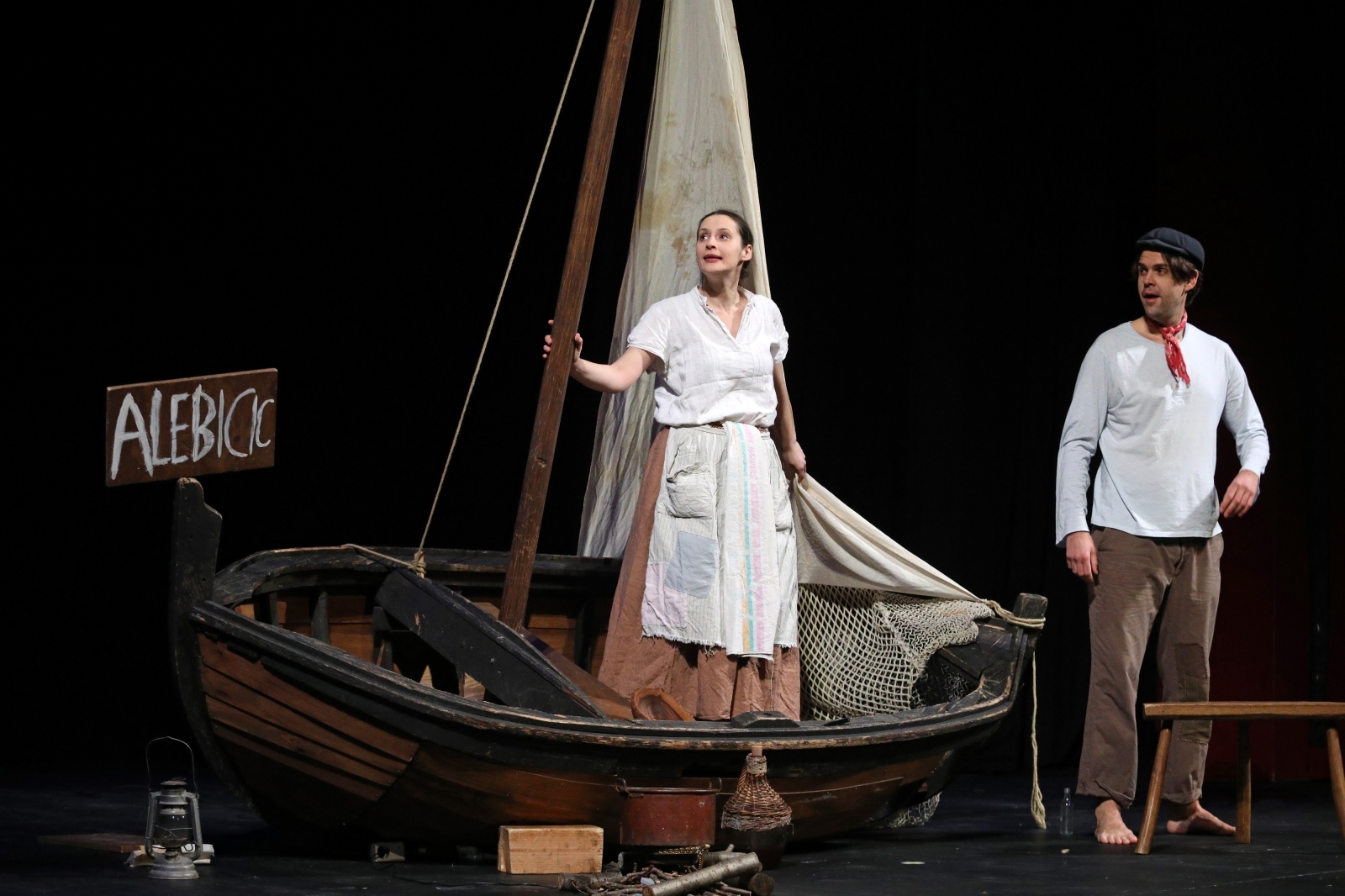
Ivan Baranović and Monika Vuco playing the title characters in an adaptation of Miljenko Smoje's play Roko and Cicibela © Dusko Jaramaz/Pixsell
Maybe it's the surprise, like the kind Splićani at the turn of the century must have felt at their unusual living arrangements, Roko's contempt for the municipality's failed attempts at charity, or them being content with what little they had. Their peculiar way of life certainly attracted the attention of travelers visiting Split between the two world wars. Thanks to them, we even know what Roko and Dujka looked like. Several years ago, Split photographer and artist Ana Perajica found probably the only photograph of the couple, taken more than 70 years ago.
To this day, the interest in their life remains as strong as ever. Whatever the reason for that may be, the story of Roko and Dujka, or Cicibela, reminds all of us living in the 21st century that happiness has little to do with material possessions and gives us a portrait of two people with an unbreakable spirit, which, many will tell you, is what Dalmatians are all about.
For more stories like this one, CLICK HERE to visit our sections dedicated to travel in Croatia.
For more on travel, CLICK HERE.
Croatia Records Jugoton Funk Reveals Hrvatska's Heaviest Grooves
ZAGREB October 23, 2020 - Preserved by Zagreb's Croatia Records, the vast archive of giant Yugoslavian music label Jugoton throws up some incredible surprises on the newly released Croatia Records Jugoton Funk Vol. 1
James Brown, Funkadelic, Sly & The Family Stone, Fela Kuti - when you think of funk music, it's black artists that usually come to mind. Although, not if you're Croatian. One of the country's best-loved (and most missed) musicians, Dino Dvornik, was often referred to as the King Of Croatian Funk - his electro explorations in the genre during the early 90s were so innovative they don't sound out of place on dancefloors today. But, though he here might be known as the king of this style, Dino Dvornik was far from the first to record funk music in Croatia.
Marijan Kašaj - Ideja
One of the highlights of Croatia Records Jugoton Funk Vol. 1. Although a classically trained opera singer, Zagreb's Marijan Kašaj expressed a much more rough vocal style when singing rock music, notably as the frontman of the band Grešnici (The Sinners). This song comes only from a rare 45 single and was composed and arranged by Vladimir Delač
The recently released Croatia Records Jugoton Funk Vol. 1 compilation finally lifts the lid on the largely untold history of homegrown Croatian funk music. Culled from the darkest depths of the gargantuan Croatia Records Jugoton archive in Dubrava, this collection tells a story of ambitious musicians joyfully creating some of the wildest sounds to have ever come from these lands. Effortlessly cool and in many cases very surprising, it is a soundtrack that is perhaps even more relevant on today's world stage than when it was made.
Dalibor Brun - Davni život
Rijeka musician Dalibor Brun explored soul and funk music across three solo albums. This track, from his third, features a wild Hammond solo performed by extremely famous Croatian singer and songwriter Oliver Dragojević. “You can hear some funky tracks in Oliver's own back catalogue, but to find him playing such a wild style as a session musician on Dalibor Brun's track is a very unexpected,” says Dr. Smeđi Šećer. “At the time of these recordings, some of these artists were already well established, so they could afford to collaborate and experiment as they wished.”
“Most of Jugoton's output was pop and folk music,” Croatia Records Jugoton Funk Vol. 1's Dr. Smeđi Šećer tells TCN. Alongside co-compiler, Zagreb's Višeslav Laboš, this Rijeka DJ is part of a small scene of enthusiasts who have been reviving the ex-Yu funk sound over recent years - online, on mixtapes and at niche club nights. “These are mostly very obscure releases. You would have to go looking around secondhand record shops for maybe 10 years to find all of these.”
Igor Savin - Alfa
Son of prominent Croatian conductor, composer and opera director Dragutin Savin (longtime director of the Osijek Opera), Igor Savin is a pianist, vibraphonist, composer, arranger and producer who studied at the Theoretical Department of the Academy of Music in Zagreb. He continued his studies by one of the first Croatian students at the prestigious American College of Contemporary Music Industry Berklee College of Music in Boston where he studied harmony, improvisation and composition. As an eighteen-year-old, he founded his first jazz band. He played piano and vibraphone in symphony, studio and festival orchestras, and in the Big Band of HRT. He is the author of music for numerous films, cartoons, television shows, theatre plays and often used melodies from Balkan folk music to inspire his jazz and contemporary classical pieces. In 1984, he founded the electronic studio of the Vatroslav Lisinski Concert Hall.
Time spent rifling through secondhand shops for old, forgotten and obscure music is a pastime known as digging. A phenomenon popularised since the birth of American hip hop in the 1980s, it has been responsible for turning the music of the past into some of the most-contemporary sounds we hear on today's radio or dancefloors. Over the last four decades, countless soul, R&B and hip hop stars have sampled older music to create chart-topping hits. Digging for vintage sounds has subsequently become a global trade. Obsessives Dr. Smeđi Šećer and Višeslav Laboš are two of the best-informed that search for contemporary-relevant sounds in the back catalogues of Balkan music.
Josipa Lisac - Ležaj od suza
'Ležaj od suza' (A bed of tears) is taken from Croatian megastar Josipa Lisac's classic debut LP 'Dnevnik jedne ljubavi'. It is not the only track on the album which you can hear international funk DJs play in some of the coolest clubs in London, Berlin, Manchester and New York. She is backed here by Jugoton's first prog-rock band, Time, plus the strings and horns section of the HRT Orchestra. The iconic cover art of Lisac's debut album was a photograph taken by Croatian photographer Jozo Ćetković, who also took the photograph of Croatian model Branka Habek which is used to form the cover art of Croatia Records Jugoton Funk Vol. 1
For Croatia Records Jugoton Funk Vol. 1, they've been greatly assisted in their endeavors by Zagreb's Croatia Records. Not always regarded as the hippest supplier of niche sounds like forgotten funk, Croatia Records's careful preservation of the Jugoton back catalogue (which they inherited after the break-up of Yugoslavia), has meant that the entire recorded history of the giant Yugoslav label has been made available not only to album compilers like Smeđi Šećer and Višeslav Laboš, but to all. Over recent years, Croatia Records has embarked on an ambitious project to digitalise the entire Jugoton archive. Containing some 70, 000 music recordings and 14, 000 artifacts, this is no small undertaking.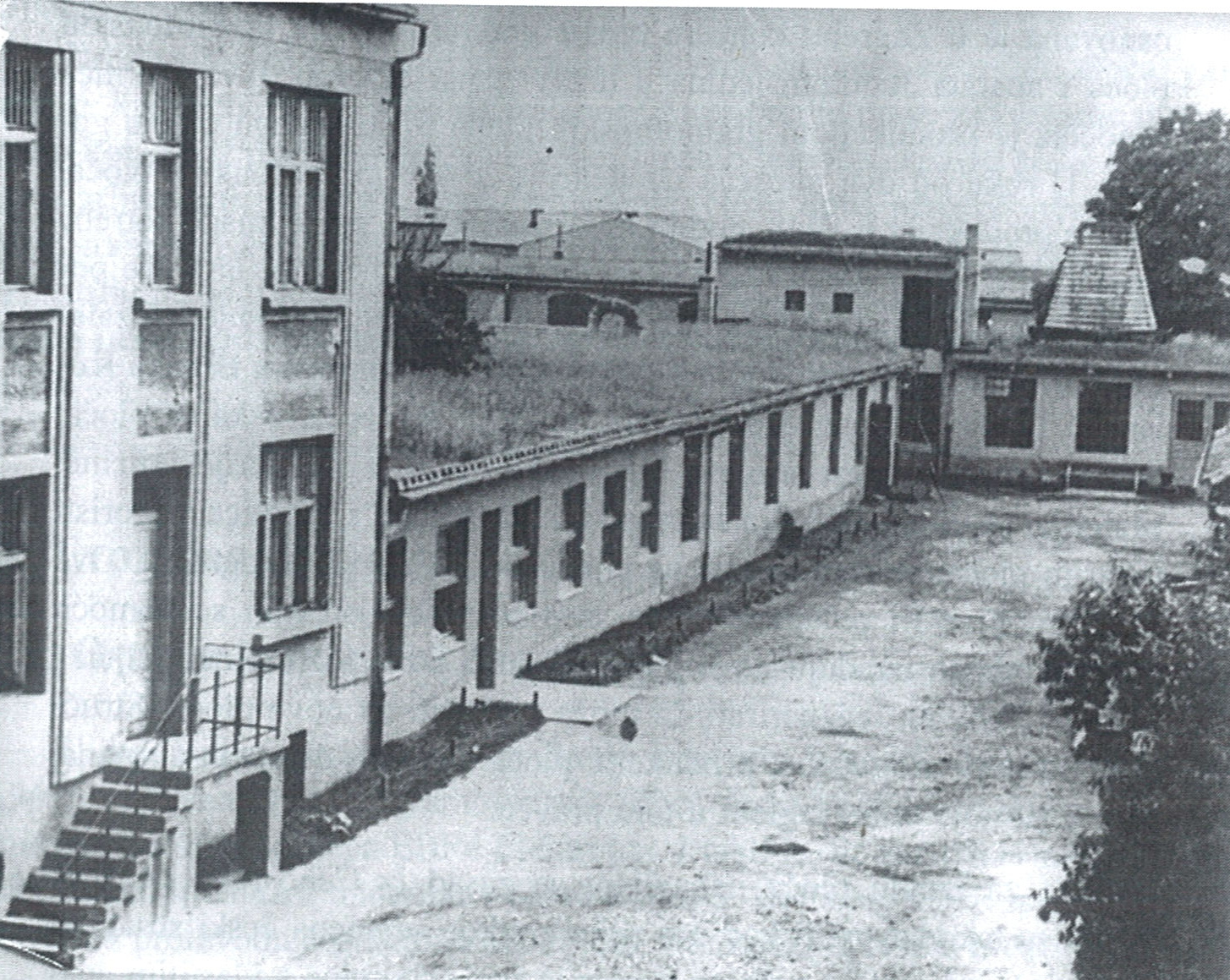 The first Jugoton Records HQ, located at Ilica 213, Zagreb. It subsequently moved to Dubrava, on the site where Croatia Records remains today © Photos from the book History of Vinyl Production in Croatia by Veljko Lipovšćak - provided by Croatia Records
The first Jugoton Records HQ, located at Ilica 213, Zagreb. It subsequently moved to Dubrava, on the site where Croatia Records remains today © Photos from the book History of Vinyl Production in Croatia by Veljko Lipovšćak - provided by Croatia Records
Of all the companies that issued music in the former Yugoslavia, Jugoton was the largest. Based in Dubrava, Zagreb, Jugoton was much more than the type of record label we know today - theirs was an entire industry of culture. Jugoton traces its roots all the way back to the 1930s when it began life as the Elektroton label. After the Second World War, the label was nationalized and renamed Jugoton.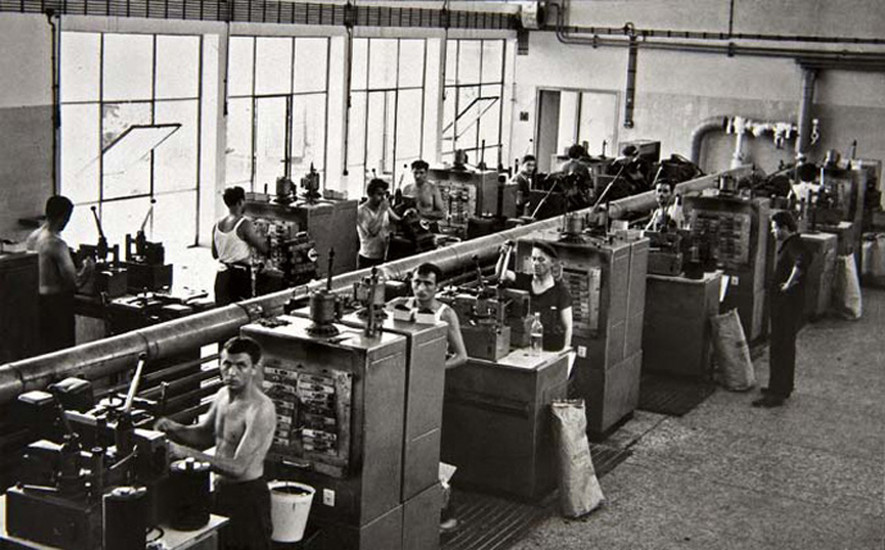
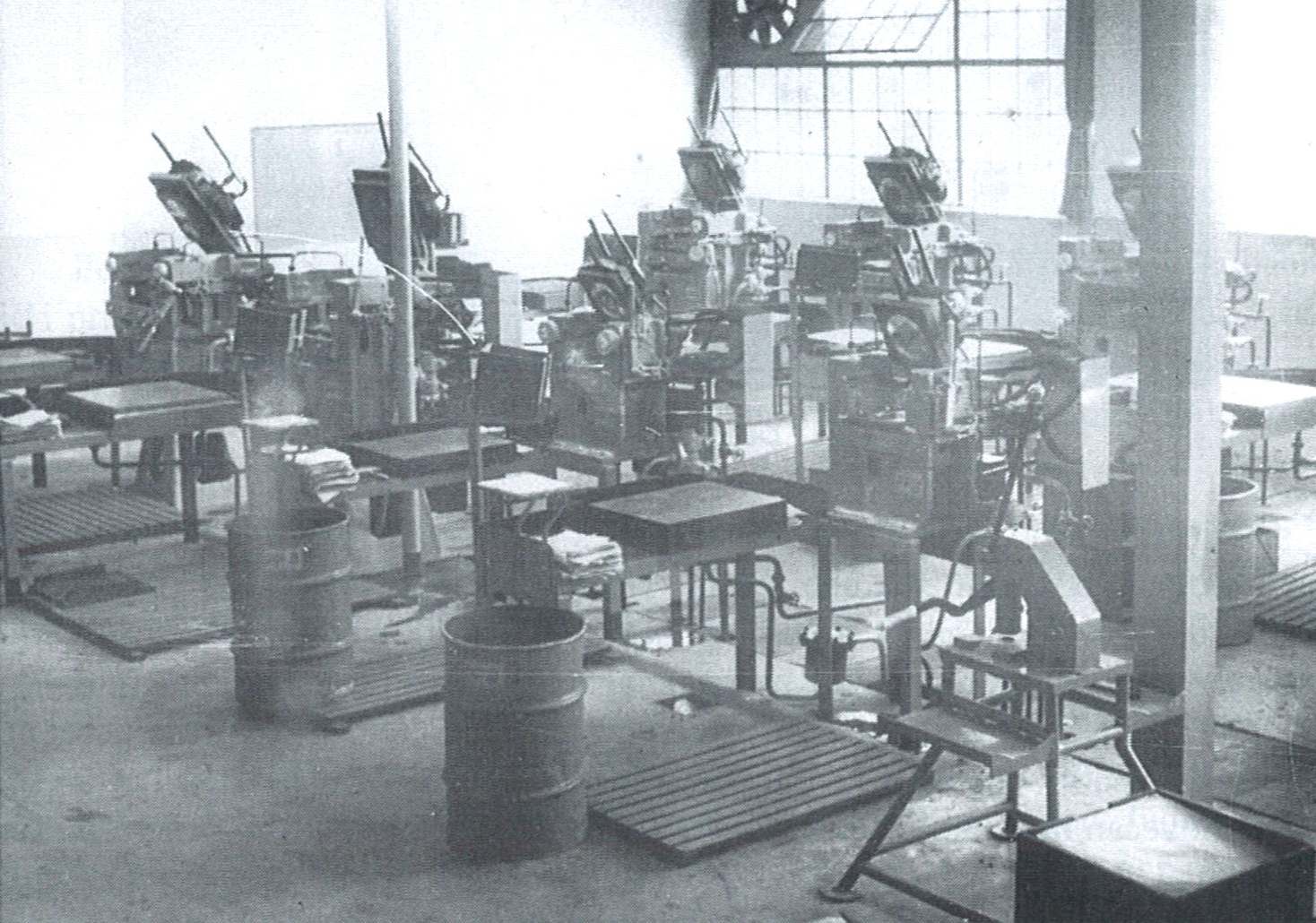 In the two photos above, we can see the Jugoton vinyl pressing factory at two different stages of its evolution © Photos from the book History of Vinyl Production in Croatia by Veljko Lipovšćak - provided by Croatia Records
In the two photos above, we can see the Jugoton vinyl pressing factory at two different stages of its evolution © Photos from the book History of Vinyl Production in Croatia by Veljko Lipovšćak - provided by Croatia Records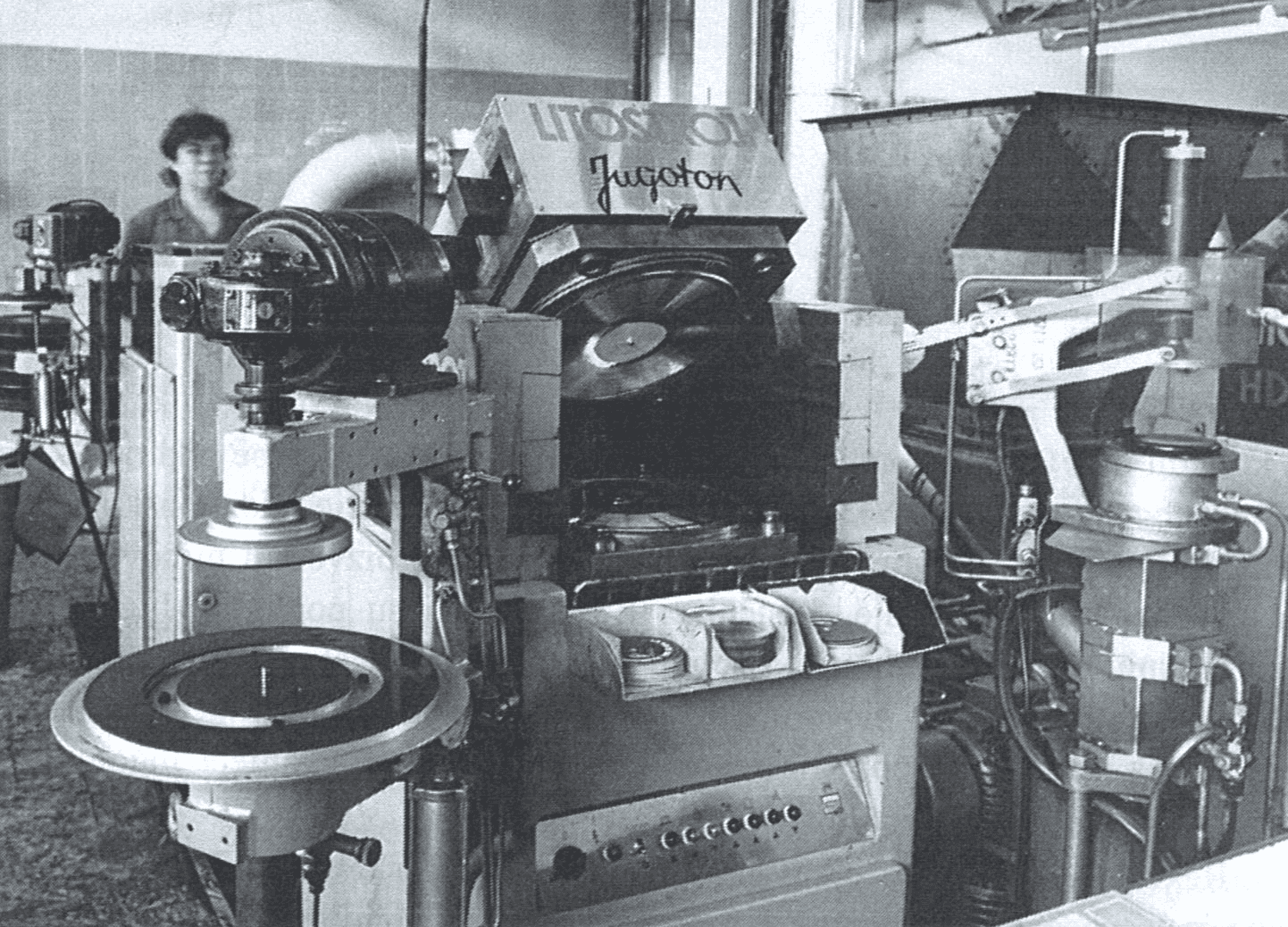 The hydraulic semi-automatic vinyl pressing machine 'Litostroj' at the Jugoton pressing plant 1967 - 1979 © From the book History of Vinyl Production in Croatia by Veljko Lipovšćak - provided by Croatia Records
The hydraulic semi-automatic vinyl pressing machine 'Litostroj' at the Jugoton pressing plant 1967 - 1979 © From the book History of Vinyl Production in Croatia by Veljko Lipovšćak - provided by Croatia Records
At the peak of its influence, Zagreb's Jugoton did more than just sign artists and release music. On the Dubrava site where Croatia Records now stands was a then ultra-modern production studio where famous artists from all over Yugoslavia would come and record. Jugoton made its own discs – at its peak, Jugoton's pressing plant churned out 30, 000 vinyl records every day. By 1982, its decade-old cassette production line made 20,000 units per day. They also owned the largest chain of music stores within the country. As well as the domestic artists signed to Jugoton, the label licensed and released music by some of the biggest artists of the day, including Elvis Presley, The Beatles, The Rolling Stones, Deep Purple and Pink Floyd. Its audience was the 20 million+ inhabitants of Yugoslavia.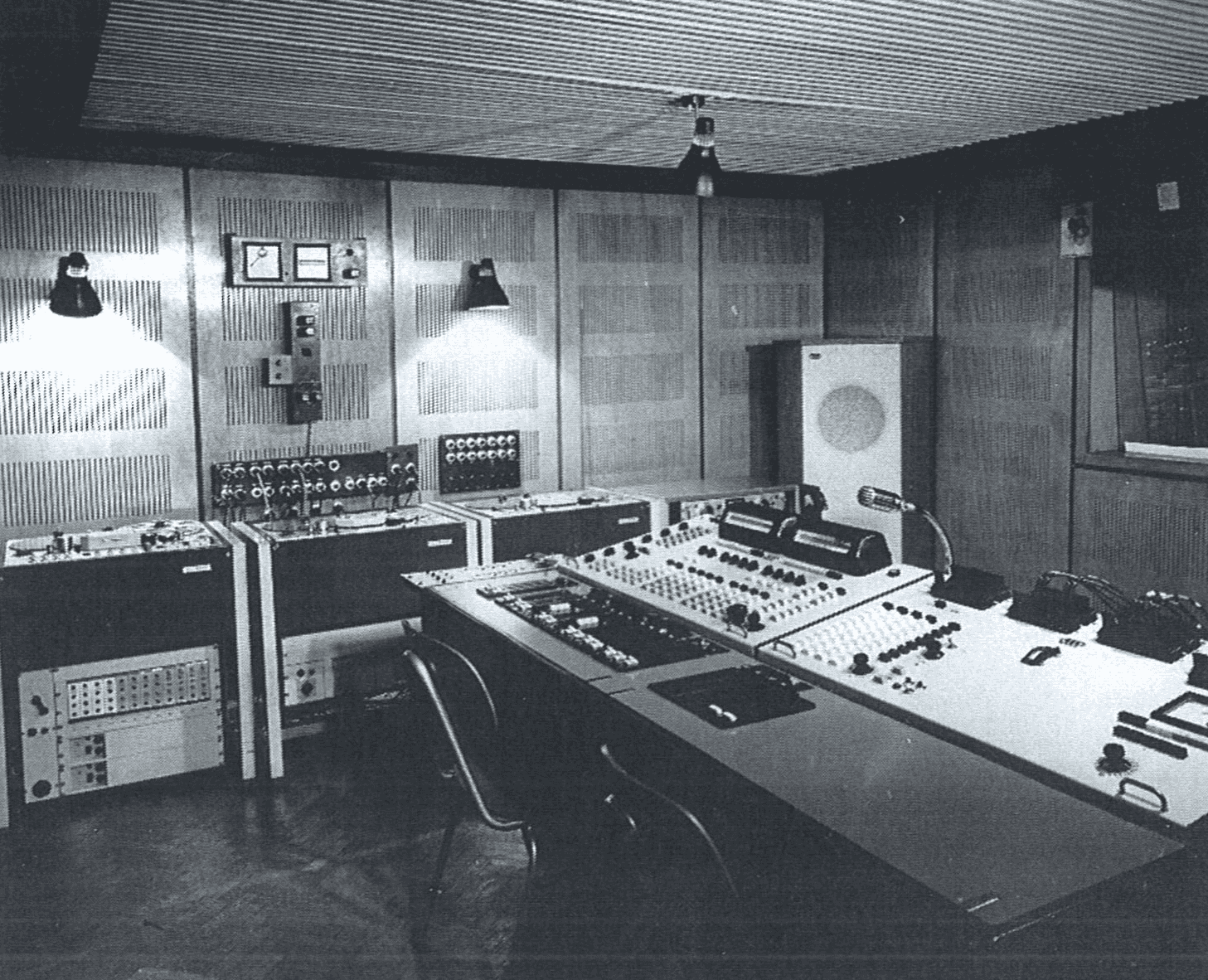 Part of the Jugoton studio set up on the Dubrava site. This specific equipment was in use between 1964 and 1975 © From the book History of Vinyl Production in Croatia by Veljko Lipovšćak - provided by Croatia Records
Part of the Jugoton studio set up on the Dubrava site. This specific equipment was in use between 1964 and 1975 © From the book History of Vinyl Production in Croatia by Veljko Lipovšćak - provided by Croatia Records
Though the music contained in Croatia Records Jugoton Funk Vol. 1 does not sound immediately like the folk and pop music we associate with the label, considering the size of the Croatia Records Jugoton archive it is perhaps less surprising that such anomalies can be found.
“Western music always had a strong appeal in Yugoslavia,” says Dr. Smeđi Šećer. “At the beginning of the communist regime, there was a strong implementation of censorship. But, in the 1960s the (communist) party seemed to relax and allow some western influences through. From this decade, a lot of cover versions of western artists started to be recorded by Yugoslavian singers. Yugoslavian labels would officially license western music and release it here. For instance, you can find releases by Ray Charles on the PGP-RTB label out of Belgrade from the early 1960s. All of this started to influence the music made here. Arsen Dedić, for example, recorded the first Yugoslavian bossa nova record in 1963.”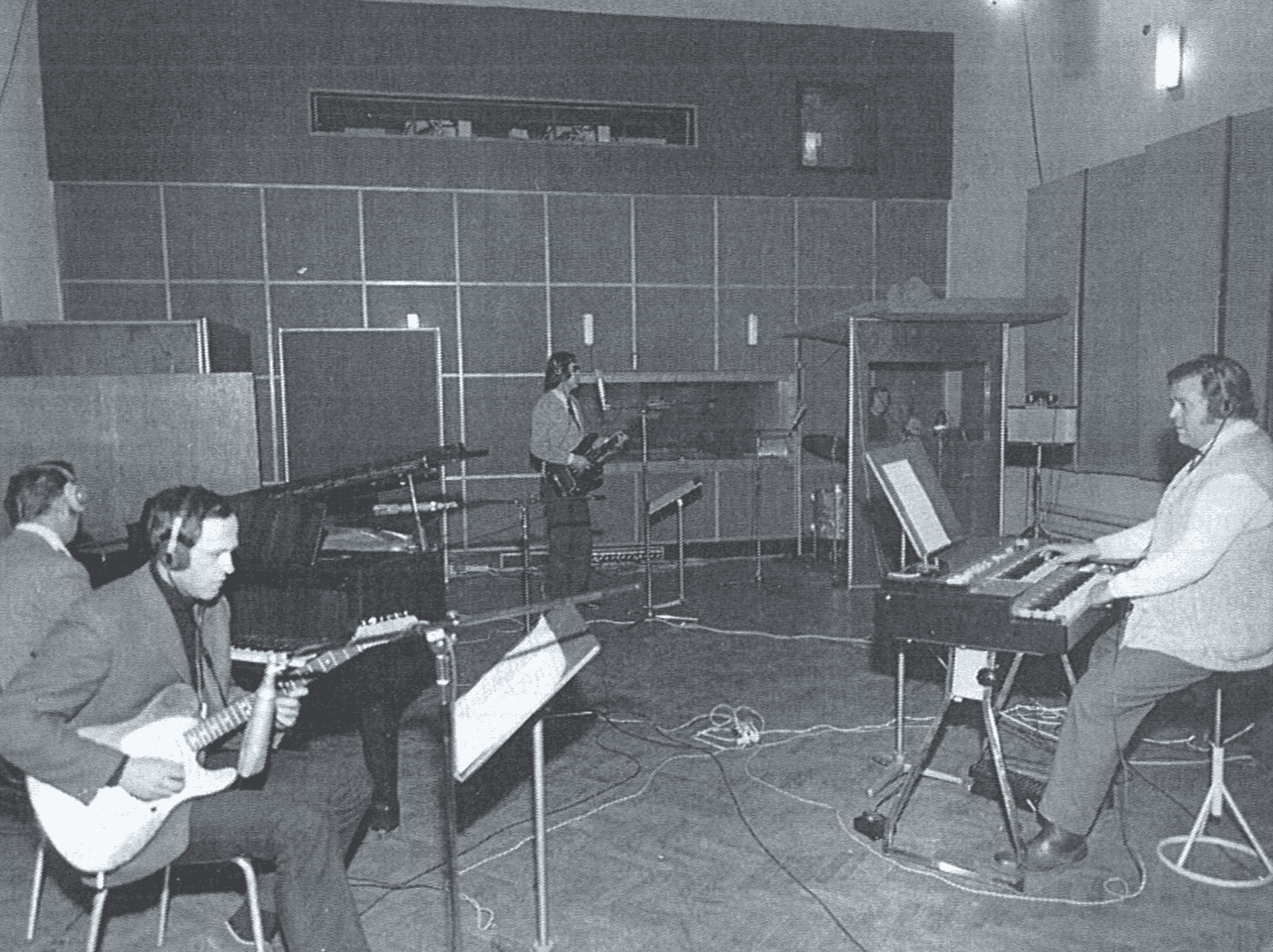 Zagreb musicians pictured at the small sound hall at Jadran film © From the book History of Vinyl Production in Croatia by Veljko Lipovšćak - provided by Croatia Records
Zagreb musicians pictured at the small sound hall at Jadran film © From the book History of Vinyl Production in Croatia by Veljko Lipovšćak - provided by Croatia Records
“The funk sound from here can be really interesting - quite unique. While some bands did try to record this black American music in exactly the style as the Americans did it, many artists from here enjoyed experimenting with the style - in particular some pop artists and progressive rock bands. They took the rhythm and the funk from the American music, but added their own styles – sometimes distinctly Balkan styles – over the top. Boki Milošević and the Belgrade Jazz Orchestra spring to mind immediately.”
Zdravko Čolić - Mujo kuje konja po mjesecu
A giant of Yugoslavian music, Zdravko Čolić's inclusion on Croatia Records Jugoton Funk Vol. 1 is one of the most unusual (and rarest) pieces of music in his back catalogue. It is a funk version of the Bosnian sevdah classic 'Mujo kuje konja po mjesecu (Mujo changes the horseshoe by the moonlight)'. “This is from an extremely rare compilation of pop festival music,” says Dr. Smeđi Šećer. “It's not something you'd come across every day. It was shown to me by a Slovenian DJ colleague. I only ever saw a physical copy of this release maybe two or three times in all my years spent digging.”
The world's largest exporter of music is the United States. The second-largest is the United Kingdom. That these two largest exporters share a common language – and it being one of the world's most widely spoken – is no coincidence. It can be difficult to export music from Croatia and other Balkan nations purely because of the language barrier. People like to understand the text of what they are listening to. Such barriers can be overcome with overtly emotional delivery, such as in the case of folk music like sevdah, but also when the musical style is something relevant to the dancefloor. Especially within a niche international scene like rare funk.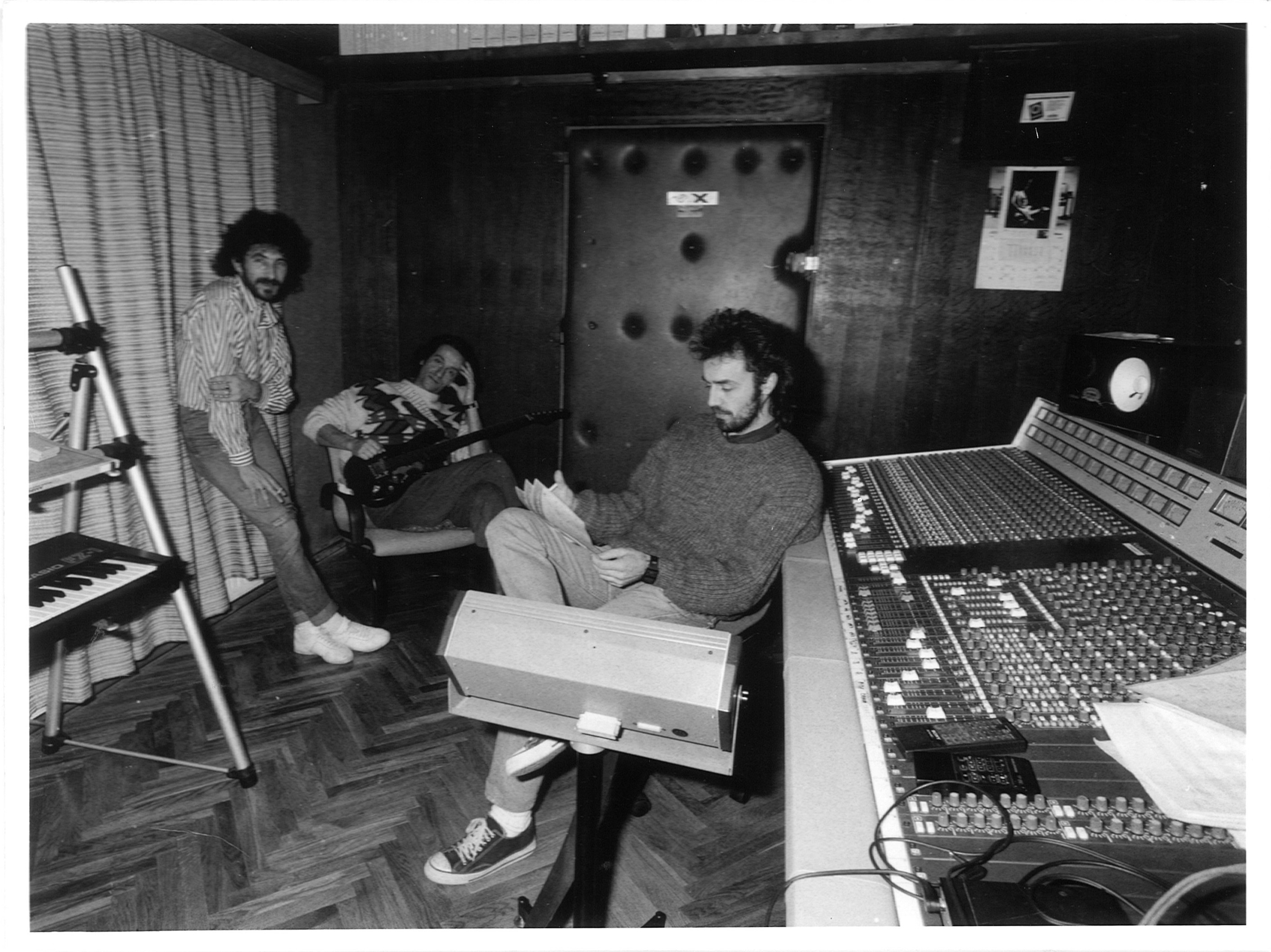 Even after the label stopped being Jugoton and became Croatia Records, famous artists from all the former countries of Yugoslavia would still come to work at the recording studios in Dubrava. In this photo from the early 1990s we see (left to right) Croatian singer Željko Bebek from the Sarajevo-formed Yugoslavian rock giants Bijelo Dugme, Macedonian guitar virtuoso Vlatko Stefanovski from the band Leb i sol and Bosnian singer, guitarist, arranger and producer Nikša Bratoš from the band Crvena Jabuka. Bijelo Dugme was the most popular and best-selling rock band from Yugoslavia. Their first recordings were offered to record label Diskoton in their native Sarajevo. They were turned down, allegedly as the label's release schedule was already full for the following six months. This is widely considered the greatest business mistake in the history of Yugoslav record publishing. On the same day as this refusal, Zagreb's Jugoton snapped the band up for an initial five-year contract © Photo from the Croatia Records archive and licensed for exclusive use within this article by Croatia Records
Even after the label stopped being Jugoton and became Croatia Records, famous artists from all the former countries of Yugoslavia would still come to work at the recording studios in Dubrava. In this photo from the early 1990s we see (left to right) Croatian singer Željko Bebek from the Sarajevo-formed Yugoslavian rock giants Bijelo Dugme, Macedonian guitar virtuoso Vlatko Stefanovski from the band Leb i sol and Bosnian singer, guitarist, arranger and producer Nikša Bratoš from the band Crvena Jabuka. Bijelo Dugme was the most popular and best-selling rock band from Yugoslavia. Their first recordings were offered to record label Diskoton in their native Sarajevo. They were turned down, allegedly as the label's release schedule was already full for the following six months. This is widely considered the greatest business mistake in the history of Yugoslav record publishing. On the same day as this refusal, Zagreb's Jugoton snapped the band up for an initial five-year contract © Photo from the Croatia Records archive and licensed for exclusive use within this article by Croatia Records
“Quite a few of these records are well known among connoisseur collectors outside of ex-Yu countries and they have a high price,” says Dr. Smeđi Šećer. “You can find Yugoslavian funk included on mixtapes by rare funk and hip hop collector DJs from all over the world. I know of one mixtape made by a well-known DJ from New York which uses only music released in the former Yugoslavia. And why shouldn't that be the case? This is the era we live in. You can go out in Zagreb and hear a Croatian DJ play Peruvian psychedelic cumbia music or afrofunk, so there are definitely DJs in the UK, the USA - maybe even Peru - who will play Yugoslavian funk. It's just feel-good dancefloor music that transcends all boundaries.”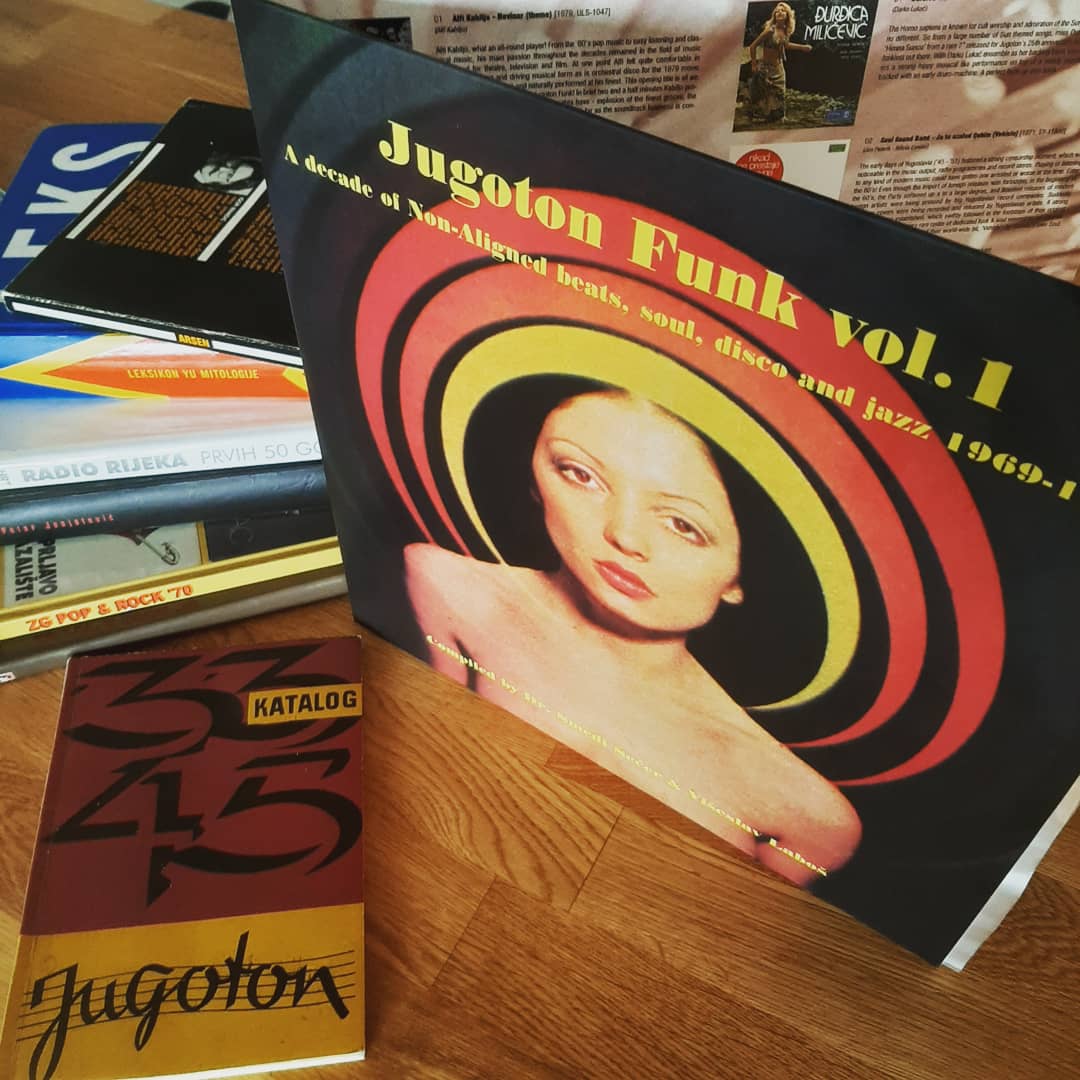
The digital and CD version of Croatia Records Jugoton Funk Vol. will be released shortly by Croatia Records. The extravagantly designed double vinyl album version is out now and was released under license by specialist Dutch vinyl company Everland Music. The last vinyl album produced by Jugoton’s vinyl pressing plant in Croatia was a disc containing the sermons of Pope John Paul II
For the latest travel info, bookmark our main travel info article, which is updated daily.
Read the Croatian Travel Update in your language - now available in 24 languages.
Croatian Post Releases New Commemorative Stamps with Legends of Croatian Music
September 26, 2020 - Croatian Post releases new commemorative stamps from the "Croatian Music" series on September 28, 2020.
As the Croatian Post website states, the motifs on the stamps show reproductions of the most famous editions of gramophone records by Dino Dvornik, Oliver Dragojević and Tomo Bebić. The authors of the commemorative postage stamps are Ivana Vučić and Tomislav-Jurica Kaćunić, designers from Zagreb. The nominal value of the stamp is the same for each motif and amounts to HRK 10.00. The stamps were printed in a circulation of 100,000 copies per motif, of which 1,000 sheets were in the corresponding numbered cases. The commemorative stamps were printed in sheets with four self-adhesive stamps, and the Croatian Post also issued a commemorative First Day Cover (FDC). Round arches imitate a gramophone record.
Dino Dvornik's musical legacy (August 20, 1964 - September 7, 2008), as well as his private and entertainment life, which are permanently intertwined, testify to the enormous talent and eruptive music in which, regardless of the scale of inspiration, is always furious rhythm and passion. It was obvious when he released his debut album in 1989, which gave the megahit "Zašto praviš slona od mene", one of the biggest - but also the best - hits from the late eighties. With it, Dino announced that funk is neither a teenage infection nor a fashionable trend, but a pure and unadulterated passion. This was also shown by the following projects, such as the album Kreativni nered, released a year later, with exceptional compositions such as "Udri jače manijače", which is at the very top of the Croatian songbook of the 1990s.
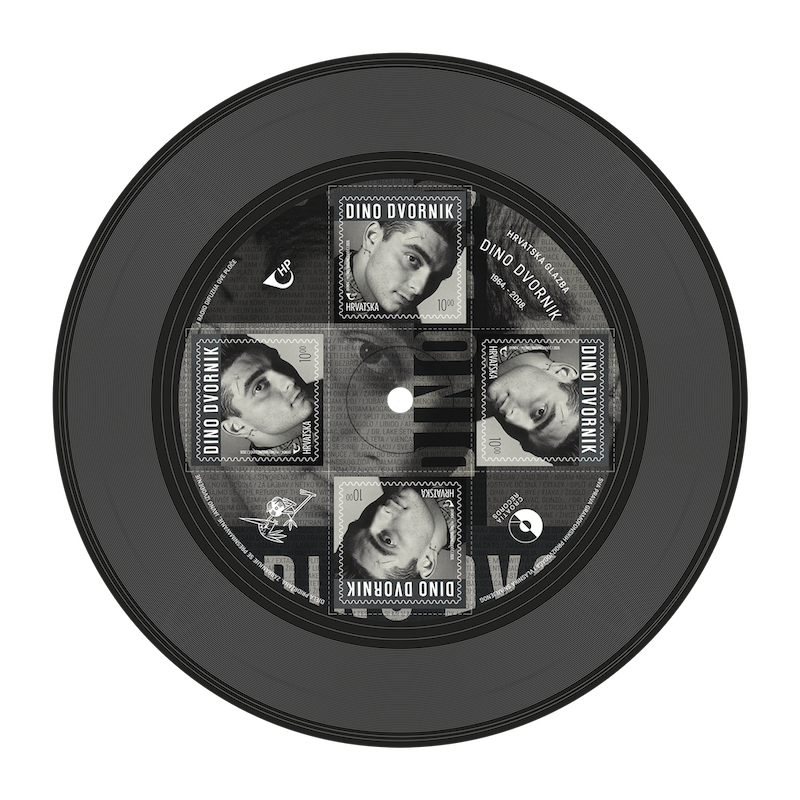
Croatian Post
If the war years deprived him of huge circulations and sold-out tours, they certainly did not affect his creativity. On the album Priroda i društvo, released in 1993, he stepped towards more serious topics, but also showed that he is equally capable of composing flawless R'n'B-pop stylizations and successfully and pioneeringly experimenting with techno/house rhythms, which are almost ubiquitous on the album. At a time when the domestic scene was leaning towards dance, in 1995 he released Africa, one of the best, but also the most influential numbers of Croatian music in the 1990s, and two years later the exceptional album Enfant Terrible. He remained on the trail of funk until the end and the album Pandora's Box, which was released posthumously immediately after the premature departure of the Croatian uncrowned "king of funk".
Oliver Dragojević (December 7, 1947 - July 29, 2018) is a singer who, just like Frank Sinatra, deserved to be called "The Voice". Also known as the "cosmic Dalmatian", the father, son, and holy spirit of Dalmatian song and "southern consolation", which he long ago patented with his emotional vocal "rasp", Oliver was certainly the best singer among musicians and the best musician among singers. A multi-instrumentalist and a great keyboardist in his long career, he has gone from rock and pop to pop music and jazzy styles. Giving his voice and soul to the numerous eternal melodies of the Split Festival written by Zdenko Runjić, in the 1990s he opened a new lucrative period and career with "Cesarica" by collaborating with many young composers.

Croatian Post
While in the seventies and eighties he was a cult "Dalmatian singer" with anthems and anthological compositions such as "Galeb", "Malinkonija", "Oprosti mi pape", "Skalinade", "Karoce", "Ništa nova", "Stine" and others, and with a range far greater than the regional borders, in the 1990s and the new millennium, he became the biggest and brightest star (not only) of the Croatian scene. Moreover, great ballads typical in the 2000s were given a unique emotional timbre by collaborating successfully with composers and musicians from other genre niches whom - just like Ray Charles, Wonder or Cocciante - he experienced as brothers in the same passion, inspiration and musical inclinations. The result is songs that, presented at the world's most important concert addresses, make the grand finale of a brilliant career of a singer (and musician) who left eternal melodies "until the end of time" with the unbearable ease of talent and musicality. As an epitaph and as a will.
Toma Bebić (1939 - February 1990), aphorist, messy poet, goatherd, a stubborn advocate of every alternative, even the author of picture books and books of twisted aphorisms, became a legend during his lifetime. Admittedly, after his untimely death, he was left with a small discographic opus, but the influence of his key compositions was much, much greater. No wonder because Toma and his most famous songs like "Kaleta", "Nevera", "Oya Noya", Ča smo na ovom svitu", "Leute moj", "Marčeline" and others became almost anthems of both traditionalists and supporters of the festival alternative from Split's Prokurative. Unfortunately, partly due to his own negligence, and partly paying a tribute to "provinciality", Toma's discography is generally weaker than the value of the songs themselves and exceptional concert performances.

Croatian Post
His compositions were mostly "Dalmatian chansons" with special dedications to the homeland, but before and after all they spoke about everyday situations and "little people", marginals with whom - as a bohemian and an anarchist - he got along best. Singing in a hoarse and suggestive voice, they flashed on Oya Noya's 1980 album, with the singer-songwriter hits "Nevera", "Leute moj", "Marčelina", "Tu-tu auto, vrag ti piz… odnija", "Za moj raj pitajte mene "... confirming Bebić's role as a pop star in the absolute deviation from the clothing of the then Split-festival hit songs. Permanently interesting as a "messy" phenomenon of "Split studies" and a distinctive chansonnier, Toma was and remains a cult figure not only of the Split but also of the Croatian music scene.
For the latest travel info, bookmark our main travel info article, which is updated daily.
Read the Croatian Travel Update in your language - now available in 24 languages
Join the Total Croatia Travel INFO Viber community.
Two Years Without Oliver Dragojevic: Croatia Remembers the Beloved Singer on July 29
July 29, 2020 - Oliver Dragojevic lost his battle with cancer on July 29, 2018, at the age of 71. Two years later, we remember the region's most beloved singer.
The famed and favorite Split musician forever closed his eyes in the early morning hours of July 29, 2018, following a tough battle with lung cancer discovered in August 2017.
Oliver Dragojevic left behind his wife Vesna, sons Dino, Davor and Damir, and five grandchildren, as well as numerous bereaved colleagues and fans. The day of his death was proclaimed a national day of mourning, and for his final farewell in Split on July 31, 2018, tens of thousands of people paid their respects in a spectacle that will be remembered and recounted for many years to come.
Hajduk Split fan group Torcida said goodbye to the musician by lighting a flare with Oliver's image from the bell tower of Sv. Duje, and for the last time, Oliver embarked on his final journey to Vela Luka with hundreds of boats glittering the sea. Oliver was buried In Vela Luka on August 2, per his wishes, and locals paid their respects for days, leaving flowers in front of the home where he was born.
In memory of his fruitful musical career, concerts and events under the 'Trace to Infinity - Memory of Oliver' theme will be held in Vela Luka this year, too.
Oliver has left an irreplaceable place on the Croatian music scene and in the hearts of his fans. Still, the memory of him undoubtedly lives on through his works and people who will participate in various ways this year in commemorating his life and work.
Slobodna Dalmacija writes that in order to preserve his heritage, various events are held throughout the week in Vela Luka, and the highlight of this year's event will be tonight's big concert, which will be held in front of the church of St. Joseph. The concert will feature Oliver's longtime associates and friends: Nina Badric, Petar Graso, Petar Dragojevic and Oliver's Dupini, along with many musicians, a string orchestra, all under the direction of producer Ante Gela.
The exhibition 'Oliver u Luci/Luka u Oliveru' by Rade Dragojevic Cosovic, dedicated to Oliver, was opened in Vela Luka, and tonight, before the concert, Zlatko Gall will present a book dedicated to Oliver Dragojevic - 'Trace to Infinity'. Wreaths were also laid and a mass and recital will be held in the church.
"It's a great honor for me to be a part of that story. For me, it's not just a concert, it's a lot of memories, my whole childhood, holidays, pranks, sadness and happiness ... it simply binds me to this concert which, I'm sure, will be full of emotions from song to song," said Petar Dragojevic in preparation for tonight's concert in honor of Oliver.
Oliver was born on December 7, 1947, and spent his childhood in Vela Luka on the island of Korčula. He fell in love with music already in his early childhood, after his father Marko gave him a harmonica.
"I could have broken it, but I kept it safe and played it all day. I was maybe 3 or 4 years old,” Oliver revealed in an interview. Oliver would entertain his peers from the neighborhood with his harmonica playing, but also the boat passengers traveling the Split-Vela Luka route.
In 1963, he was entrusted as a singer and keyboard player of the famous Batali band from Split. Four years later at the invitation of Zdenko Runjić, he made his debut at the Split Festival. He performed Runjić's "Picaferj", though his performance did not get him to the final.
Oliver then joined Dubrovački trubaduri and quickly participated in the founding of the popular group More. He returned to the Split Festival in 1995 with Runjić's song "Galeb i ja“. Though he did not win, this performance pushed Oliver alongside the biggest stars, and the rest was history.
Oliver's success is confirmed by the fact that he is one of the few Croatian musicians who can boast performances in New York's Carnegie Hall, London's Royal Albert Hall, the Olympia in Paris and the Sydney Opera House. Although he could live anywhere he wanted, his heart had always brought him back to his favorite Split - a place he never wanted to leave.
Apart from Split and Hajduk, Oliver's heart was full thanks to his wife Vesna, whom he fell in love with at first glance. He first noticed her on the Stradun in Dubrovnik while he was playing in 1973, and married her only one year later.
Even though Oliver had to cancel the concerts he had planned due to the progression of his illness, his positivity and strength carried him through to the very end. Oliver’s wife and sons were by his side as he closed his eyes forever.
Today, and always, we remember Oliver Dragojevic.
Oliver Dragojevic to be Honored with Birthday Concert at Spaladium Arena
September 10, 2019 - Oliver Dragojevic will be honored with a concert at Spaladium Arena in Split for his birthday on December 7, 2019.
His unique voice, musicality, and dedication to music led Oliver Dragojevic to a celebrated career that lasted half a century, and made him a unique phenomenon of Croatian music. He enjoyed a privileged place in the music scene, touching every fan and colleague with whom he collaborated.
Thus, a unique meeting of his colleagues, friends, and fans will be prepared in honor of Oliver's birthday, on December 7, 2019. The people of Split long desired such spectacle, designed in Oliver's way, which, unfortunately, he was unable to pursue in front of his faithful followers.
Dalmacija Danas reports that an evening of music awaits us all on December 7, 2019, at the Spaladium Arena, which is projected to be the concert of the year. The concept of the concert will be presented at a press conference by the organizers and his colleagues who will perform a tribute to the celebrated singer.

In the wake of the event, at City Center One, an exhibition of family photos and private moments of Oliver Dragojevic will be inaugurated on Friday morning through the lens of Fedja Klaric, which will last from 13.9. - 6.10.2019. Additionally, a mural dedicated to Oliver will be presented.
Recall, Oliver Dragojević was born on December 7, 1947, in Split, though he was originally from Vela Luka, where he also spent his childhood. Oliver was particularly connected with Split where he attended music school, and also made the first steps in his musical career.
His first encounter with music was at the age of five when his father Marko gifted him an accordion. Oliver would entertain passersby on his street, and boat passengers on the regular Split-Vela Luka route. His first feature appearance was at the Split Children's Festival in 1961 with the popular song 'Baloni'.
Oliver’s festival debut was at the Split Festival in 1967. He attended at the invitation of Zdenko Runjic and played the song 'Picaferaj'. Though the song did not make it to the final festival night, it became one of his eternal hits.
Throughout his lifetime, Oliver’s voice and modesty delighted his fans at concerts all over the world, and it was not unlike him to perform at humanitarian concerts to help those most in need. It was at HNK Split where he took part in the concert "Believe in Love" organized by the County Cancer League for 50 years of dedicated work. The concert was held in October 2017.
However, no one knew that it would be the last public performance of the legendary Oliver Dragojevic, whose words after the concert certainly confirm why he was an audience favorite and someone whose songs will remain forever written in the souls of his fans not only in Split, but his admirers around the world.
“Here’s something that works for the people, and that is helping anyone in need. That's the message - believe in love. Being a man is hard, and finding himself is even harder,” Oliver said at the end of the concert.
Oliver had planned to celebrate his 70th birthday with a great concert in Split, where he hoped to mark 50 years of his career, though his illness, unfortunately, prevented him from performing and the concert was finally canceled.
A few months later, in March 2018, Oliver addressed his fans at the Porin, where he was honored with the lifetime achievement award.
“I would like to mention a man who marked half my life, and that is Zdenko Runjic. There are a lot of good people around me, and this time, my disease has stopped me from being with you. As a child, I wanted to play and sing, and that dream was somehow interrupted. Hello to all the good people around me and those who have supported me in this crisis. I hope there is still time for me to sing and play, and if things get better, all will be good,” Oliver said via a video message.
"What should I say to you - enjoy, people, because life will be a fantasy," Oliver said from his home for the last time, receiving tremendous applause.
Oliver was born December 7, 1947, and died on July 29, 2018. Oliver is buried in his beloved Vela Luka.
To read more about Oliver, follow TCN's dedicated page here.
VIDEOS: Oliver Dragojević Honored Around Croatia
The legendary Oliver Dragojević was honored around Croatia with concerts and song on July 29th, one year after his passing.
An intimate concert was held in Oliver’s beloved Vela Luka, accompanied by an orchestra performed by his friends and colleagues - Gibonni, Zorica Kondža, Tedi Spalato, Dupini, Antonio Serrano, Klapa Ošjak, Alan Bjelinski, Ante Gelo and Nikša Bratoš, reports Jutarnji List on July 29, 2019.
Oliver’s celebration in Vela Luka was attended by members of his family, as well as several hundred lucky fans who succeeded in snagging tickets for the instantly sold-out event.
The atmosphere was glorious, and the emotions reached a peak that could only be reached at one of the singer’s famous concerts. The intimate spectacle was attended by about 450 lucky guests who were given a CD at the entrance.
The citizens of Split also honored Oliver by gathering at the central Pjaca for the first anniversary of the singer's passing.
Like last year, they paid tribute to the music giant by singing his songs for a full two hours, with a sizeable spontaneous Split choir led by members of Marjanke.
The young Zadar singer Jure Brkljača also decided to pay his respects to Oliver by doing a rendition of 'Ajde zbogom'. Brkljača said Oliver had been his role model from a young age.
“We will miss him forever, but his music will live forever. He is the one and only,” Jure said.
Another young Croatian singer, Dino Petrić, paid tribute to the singer by singing 'Galeb i Ja'.
American TV producer Ashley Colburn and her singing partner from the hit TV show 'Singing with the Stars', Bojan Ambrošić, also remembered Oliver as a 'true inspiration'.
The famed and favorite Split musician forever closed his eyes in the early morning hours of July 29, 2018, following a tough battle with lung cancer discovered in August 2017. Oliver Dragojević left behind his wife Vesna, sons Dino, Davor and Damir, and five grandchildren, as well as numerous bereaved colleagues and fans. The day of his death was proclaimed a national day of mourning, and for his final farewell in Split on July 31, 2018, tens of thousands of people paid their respects in a spectacle that will be remembered and recounted for many years to come.
To read more about lifestyle in Croatia, follow TCN's dedicated page.
One Year Without Oliver Dragojević: Remembering the Singer on July 29th
July 29, 2019 - Oliver Dragojević lost his battle with cancer on July 29, 2018, at the age of 71. Today, we remember the region's most beloved singer.
The famed and favorite Split musician forever closed his eyes in the early morning hours of July 29, 2018, following a tough battle with lung cancer discovered in August 2017, reports Dnevnik.hr.
Oliver Dragojević left behind his wife Vesna, sons Dino, Davor and Damir, and five grandchildren, as well as numerous bereaved colleagues and fans. The day of his death was proclaimed a national day of mourning, and for his final farewell in Split on July 31, 2018, tens of thousands of people paid their respects in a spectacle that will be remembered and recounted for many years to come.
Hajduk Split fan group Torcida said goodbye to the musician by lighting a flare with Oliver's image from the bell tower of Sv. Duje, and for the last time, Oliver embarked on his final journey to Vela Luka with hundreds of boats glittering the sea. Oliver was buried In Vela Luka on August 2nd per his wishes, and locals paid their respects for days, leaving flowers in front of the home where he was born.
Oliver was born on December 7, 1947, and spent his childhood in Vela Luka on the island of Korčula. He fell in love with music already in his early childhood, after his father Marko gave him a harmonica.
"I could have broken it, but I kept it safe and played it all day. I was maybe 3 or 4 years old,” Oliver revealed in an interview. Oliver would entertain his peers from the neighborhood with his harmonica playing, but also the boat passengers traveling the Split-Vela Luka route.
In 1963, he was entrusted as a singer and keyboard player of the famous Batali band from Split. Four years later at the invitation of Zdenko Runjić, he made his debut at the Split Festival. He performed Runjić's "Picaferj", though his performance did not get him to the final.
Oliver then joined Dubrovački trubaduri and quickly participated in the founding of the popular group More. He returned to the Split Festival in 1995 with Runjić's song "Galeb i ja“. Though he did not win, this performance pushed Oliver alongside the biggest stars, and the rest was history.
Oliver's success is confirmed by the fact that he is one of the few Croatian musicians who can boast performances in New York's Carnegie Hall, London's Royal Albert Hall, the Olympia in Paris and the Sydney Opera House. Although he could live anywhere he wanted, his heart had always brought him back to his favorite Split - a place he never wanted to leave.
Apart from Split and Hajduk, Oliver's heart was full thanks to his wife Vesna, whom he fell in love with at first glance. He first noticed her on the Stradun in Dubrovnik while he was playing in 1973, and married her only one year later.
Even though Oliver had to cancel the concerts he had planned due to the progression of his illness, his positivity and strength carried him through to the very end. Oliver’s wife and sons were by his side as he closed his eyes forever.
Today, and always, we remember Oliver Dragojević.
Translated from Dnevnik.hr
To read more about lifestyle in Croatia, follow TCN's dedicated page.

